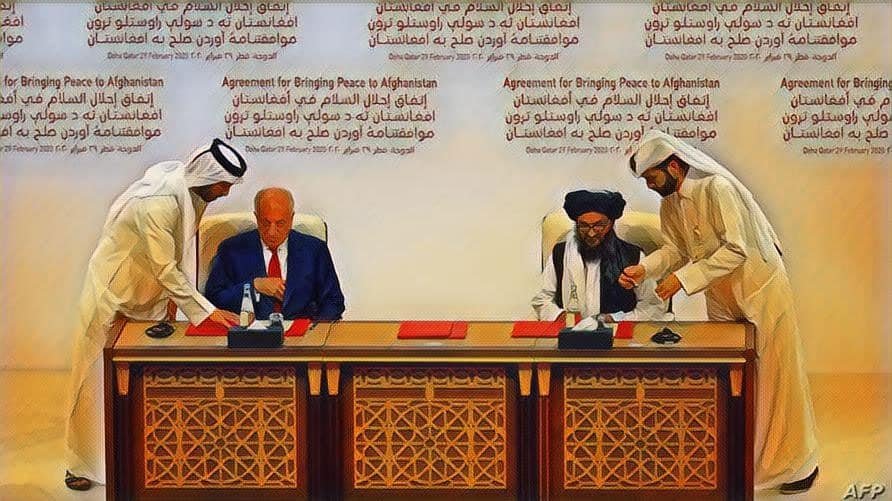After more than 18 years of US-led conflict and violence, it recently (signed on February 29 in Qatar’s capital) negotiated a fragile peace treaty with Taliban. This ongoing Afghan war is the one of the largest conflicts that has inflicted serious blow to American political front, war strategies and the status of war.
This is the same Taliban which US had been designing as small and poor radical militant outfit for decades that “this Taliban does nothing but only terrorise the masses.” But now the things are not same, now both Taliban and United States can be seen discussing the erstwhile issue over a cup of tea with much more soothing ease. It can be said with cent percent surety that the ball has landed in the courtyard of Taliban and United States have no option other than to withdraw their troops from the conflict engulfed region.
It is astonishing to see that the US President calls the decade-long conflict a waste of American blood and capital and seems more interested in settling the pending issue than Afghan Taliban and other parties which did serve the devastated region for long.
This long awaited mass agreement of world includes a timeline of few months for US and it’s ally troops (mainly NATO) to withdraw from the region. Moreover, in the signed peace deal, the Taliban guaranteed that it would not threaten the US security troops in any way, but it would continue to draw it’s moves against local oppressive regime.

Over nearly 20 years, the US has spent 876.4 thousand dollars, according to the US Inspector General for Afghanistan, but despite its investment of arms, capital and soldiers, the United States stands as the sole preacher of non-violence and peace at the current times. However, would the peace, that has been a dream for decades, return to the crippled region soon or not, there cannot be a simple answer to such hypothesis but it can be well predicted that the state of region is, although slowly but recovering from bad to good.
Meanwhile, the country’s leadership remains in a steady state of political crisis. The Afghan President Ashraf Ghani and other leaders of opposition parties, who are going to become no-authorities soon seem alternating between hope and despair and may prove hostile for the peace in region. It’s because they think their own future is suffering a great dismay and there would be no chances for their interim government to be established if the signed deal comes true.
Current Afghan government and political elites can be seen blaming Pakistan for the insurgency that prevailed in the region ever since the conflict broke out. Afghan officials deeply distrust Pakistan. However, experts say that if the talks really go well, Pakistan will wind up with a friendly government in Kabul. However, if the process falls apart, it would cause trouble for Pakistan. But still Taliban would derive strategic benefits and nourishment in the region, which in turn will contribute to regional interests of Islamabad.

Former senior US government analyst, Mr. Zachary Constantino writes that precipitate US withdrawal without a broad-based peace deal would help “Pakistan’s incentives to alleviate domestic pressure to retaliate over Kashmir” through proxy operations in Afghanistan. In an article, he concludes that Afghanistan is a theatre of competition, bound to the more significant dynamics driving the India-Pakistan conflict, which show no sign of abating.”
Pakistan, which has been a main support behind the moves of Taliban too seems awaiting on the banks of uncertainty that if anything interrupted the peace deal, its years’ long interests and dreams will fade away. But all know that is not going to happen anyway. Both US and Afghan governments are left in peril with no second option other than to accept the signed deal.
Pakistan, which seems running the show for long, fears every threat which may pose harm to the signed peace deal. In his paper titled “Escape from Afghanistan”, Syed Arshad Hussain Kashani notes in his paper published last month that ‘the landmark Doha deal is a huge victory for Islamabad, as the Taliban, the militant group that Pakistan had always favoured, is once again back in the driving seat.’ So looked Shah Mahmood Qureshi, Pakistan’s Foreign Minister, conspicuously satisfied with the signed peace deal in Doha.
While writing on this, Tom Hussain, a columnist and political analyst based in Islamabad Pakistan, notes “the US-Taliban deal, which envisages the withdrawal of foreign forces from Afghanistan by the end of April next year, is a win-win for Pakistan.” So is crystal clear that for Pakistan, the US-Taliban deal is an opportunity for stability but it portends several challenges for India.
India’s development assistance to Afghanistan has gone up to $3 billion, would India continue to aid Afghanistan or not? We cannot simply answer this question, as it is not only the matter of capital, US-Taliban deal poses several dangers to India’s national security as well. In fact, the future of Afghanistan has a lot to do with the portrait of New Delhi.
If the peace deal gets accomplished, there would be political settlement at large and Taliban would be benefited less or more with some powers. But if US troops left with no political settlement in the region, Taliban is going to become a lone authority. This will, however, concrete the very basis of Taliban in the region.

India wanted to become a key stakeholder in reconstruction and reconciliation of war affected region but Taliban seems least interested in it. Lately, Taliban dropped India from its Thank You List and forced its political elites to rethink the Afghan realities. It may be because lately India had been involved in supportive aids to northern alliance that kept armed pressure against the Taliban. That’s why masses fear Afghanistan’s future would be problematic for India.
Even now, India doesn’t consider inking of mass deal in Doha as a potent way of bringing peace and prosperity to depraved region. India’s Foreign Minister, Subrahmanyam Jaishankar in a press event last month admitted this fact by expressing that “our message to the US is that achievements of the last 18 years should not be lost”. Shyam Saran, the former Foreign Secretary also expressed the same apprehension. “Cohesive are the various players, does the Taliban join the democratic set-up, or will the democratic set-up have to adjust to the Taliban…We are all watching this space,” he said in a press release.
Struggle with consistency bring out great results is the main lesson radical outfits across world can draw from this decade long armed insurgency. Indian analysts and security experts fear that the return of Taliban would be a victory of fundamentalism in the world and it would pose danger to its national integrity, because India too manages a crippled warfare State where the youngsters are conscious, politically aware and angry against the policies of government. “If the mighty superpower USA could be defeated by the Taliban in Afghanistan with help from the Pakistan Army, defeating Indian forces won’t be impossible after all,” writes Happymon Jacob who teaches national security at the JNU Delhi. This is the main reason why India looks dissatisfied at every stage of the deal.
What happens in Afghanistan has a direct effect and holds many concerns for New Delhi. In case Taliban comes to direct authority in any way, India may need then self-confidence and proper strategies to deal with challenges which would arise from the liberation. Thus, India seems to be the most unfortunate victim of recent US-Taliban signed deal.
Standing at the losing end in Afghanistan’s unfolding table of chess and patience, India in multiple aspects, may emerge as a poor commodity in the near future. Recanting troops is a good option for America and its allies, but is surely a ghost worry for India – the largest democracy in the world.
Follow Us
The Kashmir Pulse is now on Google News. Subscribe our Telegram channel and Follow our WhatsApp channel for timely news updates!











